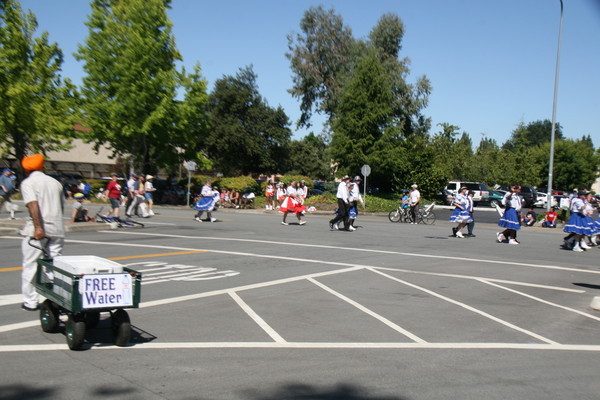My family's journey reminds me of what it means to be American.
 |
| A Sikh man pulling a water cart at the Fremont 4th of July Parade Credit : Neena Barreto |
A Sikh man in a saffron turban happily handing out bottles of water to red, white and blue-clad parade goers. An annual block party where neighbors who shyly live next to each other all year finally come out of their shells, patting each other heartily on the back over barbecue grills and picnic tables.
This is Fourth of July in the Tri-City area, and although it’s not easy to get along or agree all the time, it’s the one day when people come together in the spirit of being American.
It is the one day to celebrate being able to live in a multicultural society, and the effort it takes to be here.
I used to think that by being multicultural, I was the epitome of the American Dream. It proved that different cultures could get along seamlessly and create beautiful, unique children.
That may be true to a point, but the reality is that it takes tremendous effort for different ethnicities to coexist in one house, neighborhood or classroom. My ancestors, many immigrants and our forefathers all have one thing in common, though — diligence — and their struggles are a common badge of honor.
On my mother’s side I can trace intermarriage back to my great-grandfather, Papa Moshe, a Ukrainian Jew, who married a German Lutheran in war-torn Germany. To save his life and those of his oldest half-Jewish sons, he left his wife and younger children behind, never to see them again.
They managed to find passage on board a ship to China, the only country accepting Jewish refugees at the time. Papa Moshe and his boys lived there for 10 years, learning Chinese and living in a small slum designated for Jews, until he was able to arrange for them to come to America at the war’s end.
Very soon after they established themselves in San Francisco, Papa Moshe’s son, Walter, my grandfather, happened upon the loveliest “Spanish girl” while listening to classical music played at Stern Grove. My grandmother, a fiery Salvadorena named Margarita, had been sent to live with her older brother in the United States to tear her away from her military boyfriend, of whom her father did not approve.
Although Walter unexpectedly died shortly after his marriage to Margarita, they were able to have one child, my mother, who spent her childhood going to Catholic school in the City and occasionally spent her summers in El Salvador. When my mom grew up and went to City College, she happened to share a street car with a certain man on scholarship from India, my father, and they hit it off.
What makes someone leave a country for another? War, heartbreak and a fresh opportunity in my family’s case, all of which took tremendous courage and diligence to make a life for themselves in America.
I think of the first time my father met my father-in-law, and how their stories were so similar even though they came from different parts of the world. I think of my grandmother sharing a hug and laugh with my paternal grandmother, even though they had no language in common.
It takes some effort and hard work to be American. As I look at my boys with their wonderfully complicated backgrounds, I think that with a little drive left over from their grandparents' colorful journeys, they can live the American Dream, too.
